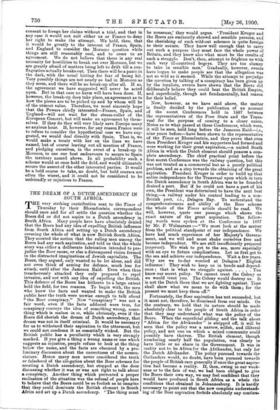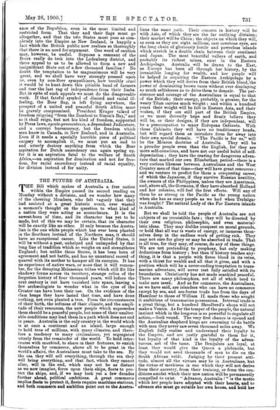THE DREAM OF A DUTCH ASCENDENCY IN SOUTH AFRICA. T HE
very striking contribution sent to the Times of Thursday by their Bloemfontein correspondent should once and for all settle the question whether the Boers did or did not aspire to a Dutch ascendency in South Africa. Many people here have absolutely denied that the Boers had any idea of expelling British influence from South Africa and setting up a Dutch ascendency covering the whole of what is now British South Africa. They scouted the notion that the ruling men among the Boers had any such aspiration, and told us that the whole story was either a deliberate fabrication intended to pre- judice the Boer cause, or else a distempered vision formed in the distracted imaginations of Jewish capitalists. The Boers, they argued, only wanted to be let alone, and did not even think of arming for defence, much less for attack, until after the Jameson Raid. Even when thus treacherously attacked they only prepared to repel invasion, and not with any idea of expelling the British. This defence of the Boers has hitherto to a large extent held the field, for two reasons. To begin with, the men who knew the facts and wanted to make the British public hear the truth were unwise enough to talk about "the Boer conspiracy." Now "conspiracy" was not a fair word, even if the facts adduced were true, for conspiracy conveys the idea of something wrong, some- thing which is malum in se, while obviously, even if the Boers did cherish the dream of Dutch ascendency, that dream was not in itself criminal. It would be necessary for us to withstand their aspiration to the uttermost, but we could not condemn it as essentially wicked. But the British public has a peculiarity which is very strongly marked. If you give a thing a wrong name or one which suggests an injustice, people refuse to look at the thing below the name, and the facts are obscured by a pre- liminary discussion about the correctness of the nomen- clature. Hence many men never considered the truth or falsehood of the allegation about the Boer schemes for creating a Dutch ascendency, but stopped at the door discussing whether it was or was not right to talk about a conspiracy. Another thing which prevented a proper realisation of the situation was the refusal of people here to believe that the Boers could be so foolish as to imagine that they could dominate the British element in South Africa and set up a Dutch ascendency. 'The thing must be nonsense,' they would argue. 'President Kruger and the Boers are eminently shrewd and sensible persons, and the cherishing of such wild-cat schemes is quite foreign to their nature. They know well enough that to carry out such a purpose they must face the whole power of Britain, and they know also what must be the results of such a struggle. Don't, then, attempt to frighten us with such very ill-contrived bogeys. They are too clumsy to take in sensible men.' Gradually, however, events have begun to make people see that the allegation was not so wild as it seemed. While the attempt to prejudge the question by talking of a conspiracy has been given up by the loyalists, events have shown that the Boers did deliberately believe they could beat the British Empire, and superficially, though not fundamentally, had reason for their belief.
Now, however, as we have said above, the matter is finally decided by the publication of an account of the secret Conferences held in 1887 between the representatives of the Free State and the Trans. vaal for the purpose of coming to a closer union. Notes as to what passed at these Conferences, which were, it will be seen, held long before the Jameson Raid—i.e., nine years before—have been shown to the representative of the Times at Bloemfontein, and they prove that even then President Kruger and his supporters had formed and were working for their great aspiration,—a united South Africa in which the Dutch element should possess a com- plete ascendency. The chief practical point before the first secret Conference was the railway question, but this was not treated as a commercial but as a purely political problem, and as a step towards the obtaining of the great aspiration. President Kruger in order to build up that entire independence for the Transvaal upon which in turn the Dutch ascendency in South Africa was to be founded desired a port. But if he could not have a port of his own, the President was determined to have the next best thing,—a railway under his control leading to a non- British port, i.e., Delagoa Bay. To understand the comprehensiveness and ability of the Boer scheme the whole of the Times article should be read. We will, however, quote one passage which shows the exact nature of the great aspiration. The follow- ing words were spoken at the Conference in 1887 by Mr. F. Wolmarans :—" We must look at the matter from the political standpoint of our independence. We have had much experience of her Majesty's Govern- ment, and we will and must shake ourselves free and become independent. We are still insufficiently prepared (ongerust). We wish to get to the sea, more especially with an eye to future complications. Let us first get to the sea and achieve our independence. Wait a few years. Why are we to-day worried at Delagoa ? English influence ! They wish to keep us in bonds and depend- ence; that is what we struggle against You know our secret policy. We cannot treat the Colony as we would treat you. The Colony would destroy us. It is not the Dutch there that we are fighting against. Time shall show what we mean to do with them; for the present we must keep them off."
Fortunately, the Boer aspiration has not succeeded, but it must not, therefore, be dismissed from our minds. On the contrary, we hold that its nature should be made absolutely clear to the people of South Africa in order that they may understand what was the policy of the Boers. When the superficial gilding and the talk about "Africa for the Afrikander " is stripped off, it will be seen that the policy was a narrow, selfish, and. illiberal policy, and not one on which a mixed community could possibly have thriven. The British element, though numbering nearly half the population, was clearly to have little or no share in the Government. It was in reality not to be Africa for the Afrikander, but only for the Dutch Afrikander. The policy pursued towards the Outlanders would, no doubt, have been pursued towards the people of British race generally if once the great aspira- tion had become a reality. If, then, owing to our weak- ness or to the fate of war, we had been obliged to give the Boers their own way, we may feel confident that they would have produced in South Africa as a whole the conditions that obtained in Johannesburg. It is hardly necessary to point out that the now complete understand- ing of the Boer aspiration forbids absolutely any continu. ance of the Republics, even in the most limited and restricted form. That they and their flags must go altogether, and that the two States must pass as com- pletely into the Empire as New Zealand, is happily a fact which the British public now realises so thoroughly that there is no need for argument. One word of caution may, however, be useful. Suppose a remnant of the Boers really do trek into the Lydenberg district, and there appeal to us to be allowed to form a new and insignificant State out of a few thousand families ? No doubt the temptation to be magnanimous will be very great, and we shall have very strongly pressed upon us, even by non-Boer sympathisers, how terribly cruel it would be to hunt down this pitiable band of farmers and tear the last rag of independence from their limbs. But in spite of such appeals we must do the disagreeable work. If that fateful symbol of discord and racial ill. feeling, the Boer flag, is left flying anywhere, the prospect of a united and peaceful South Africa must be gravely compromised. President Kruger talked of freedom reigning "from the Zambesi to Simon's Bay," and so it shall reign, but not his kind of freedom, supported by Press laws, agents-provocateurs, a dependent Judicature, and a corrupt bureaucracy, but the freedom which men know in Canada, in New Zealand, and in Australia. Even if it needs a specially horrible piece of political surgery to accomplish it, we must put an end to and utterly destroy anything from which the Boer aspiration for Dutch ascendency can again spring up, for it is an aspiration fatal to the welfare of South Africa,—an aspiration for domination and not for free- dom, for racial ascendency instead of racial equality, for division instead of for unity.







































 Previous page
Previous page